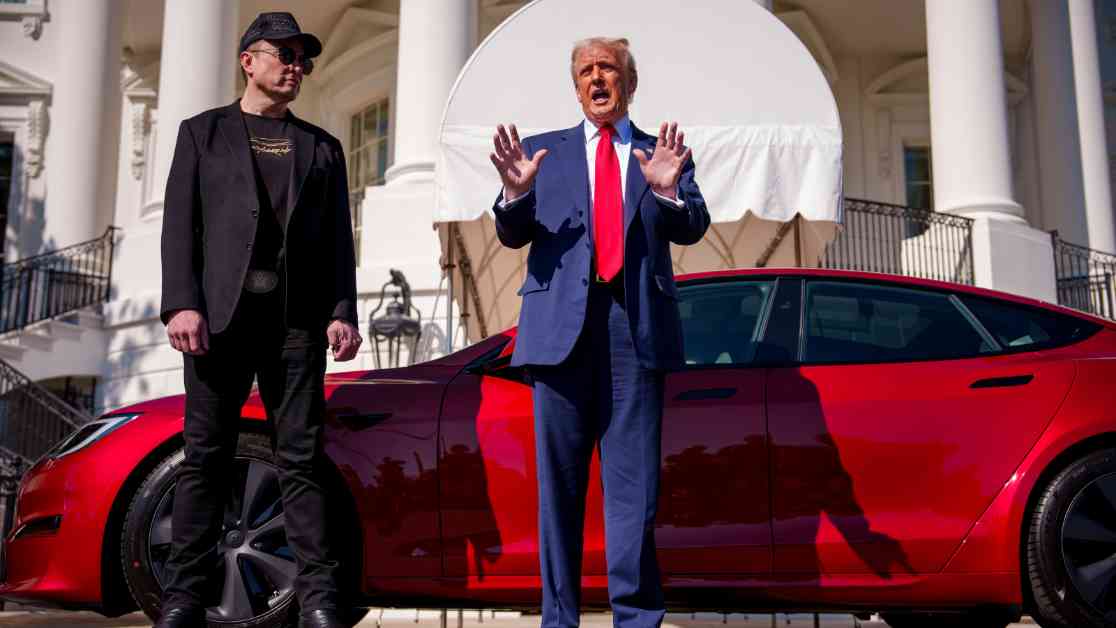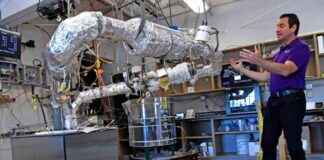The controversial intersection of politics and electric vehicles recently took center stage when President Donald Trump, a known skeptic of EVs, made a surprising move. Trump, who once expressed disdain for supporters of electric vehicles, proudly displayed his new Tesla Model S in front of the White House. The red Tesla, reminiscent of his iconic Make America Great Again hats, sparked curiosity and conversation. Trump showered praises on Elon Musk, the Tesla CEO, lauding the company’s vehicles as “beautiful” in a surprising twist that left many scratching their heads.
Trump’s public endorsement of Musk’s brainchild, Tesla, raised eyebrows across the political spectrum. Tesla, the leading EV manufacturer in the country, has faced challenges lately, with a significant drop in sales globally leading to a sharp decline in its stock value. As Musk, who also heads the newly formed Department of Government Efficiency (DOGE), makes waves in reshaping the federal government, Tesla’s vehicles have become a contentious symbol in Democratic circles. Many liberal Tesla owners, once proud supporters, now express disillusionment with Musk by adorning their vehicles with stickers reading “I bought this before Elon went crazy.”
The fervent emotions surrounding Musk and Tesla have created a ripple effect in the realm of EV politics. Trump’s unexpected flaunting of a vehicle running on electricity, rather than gas, came as a defense of Musk and his perceived mistreatment. The scene at the White House seemed surreal, akin to a satirical sketch from Saturday Night Live, especially given the administration’s efforts to roll back pro-EV regulations put in place by the Biden administration. The unlikely alliance between Trump and Musk, two prominent figures in MAGA politics, advocating for a technology that traditionally clashes with conservative values, adds an intriguing layer to the ongoing saga.
Support from Unlikely Quarters
In a surprising turn of events, several notable Republicans, including House Speaker Mike Johnson and Georgia Representative Marjorie Taylor Greene, stepped up to defend Tesla against what Trump labeled as “domestic terrorism” in response to vandalism at Tesla dealerships. This sudden shift in perception, with Tesla transforming from a Democratic status symbol to a Republican favorite, hints at a potential bipartisan embrace of EVs. Joe Sacks, executive director of the American EV Jobs Alliance, sees Musk as a pivotal figure capable of bridging the divide and fostering a constructive debate on the future of electric vehicles.
According to recent polling conducted by the alliance, Elon Musk’s popularity among Republicans has surged, with a significant percentage viewing him as a positive influencer for EVs. The data aligns with an analysis by the financial services firm Stifel, indicating a growing favorability towards Tesla among Republican consumers. While EVs, particularly Teslas, have traditionally appealed more to Democratic buyers, the tide seems to be turning, with Republicans showing increased interest in these cutting-edge vehicles.
Navigating Political Crossroads
Despite the evolving landscape of EV adoption among Republicans, challenges remain in convincing traditional-minded conservatives to embrace electric vehicles. Marc Hetherington, a political scientist at the University of North Carolina at Chapel Hill, highlights the inherent resistance among conservatives towards new technologies like EVs. While Tesla’s allure lies in its sleek design and superior performance, Republicans often gravitate towards gas-powered vehicles for practical and familiar reasons, as noted by Alexander Edwards of Strategic Vision.
As Democrats and Republicans navigate the shifting dynamics of the EV market, Tesla’s image has undergone a transformation, reflecting the divisive persona of its eccentric CEO, Elon Musk. Musk’s controversial forays into politics and social media have cast a shadow over Tesla’s once-universal appeal, complicating the narrative around EV adoption. The enduring challenge lies in depolarizing the conversation around electric vehicles, focusing on their tangible benefits and shared values rather than political affiliations.
In the grand scheme of things, Trump’s newfound admiration for his electric Tesla hints at a broader trend towards bipartisan cooperation on EV issues. Musk’s influence, transcending political boundaries, underscores the power of innovation and collaboration in shaping the future of transportation. As the debate rages on, one thing remains clear: the intersection of electric vehicles and politics is a complex landscape where unexpected alliances and ideological shifts can redefine the narrative, one Tesla at a time.














